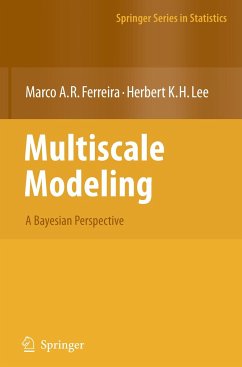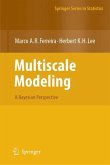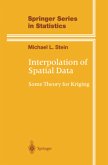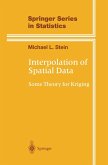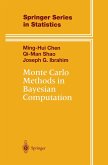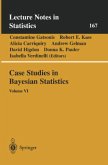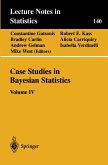A wide variety of processes occur on multiple scales, either naturally or as a consequence of measurement. This book contains methodology for the analysis of data that arise from such multiscale processes. The book brings together a number of recent developments and makes them accessible to a wider audience. Taking a Bayesian approach allows for full accounting of uncertainty, and also addresses the delicate issue of uncertainty at multiple scales. The Bayesian approach also facilitates the use of knowledge from prior experience or data, and these methods can handle different amounts of prior knowledge at different scales, as often occurs in practice.
From the reviews:
"Readership: Students and practitioners of Multiscale Modeling and Analysis by Bayesian methods.... This is a wonderfully written review of what is known about multiscale modelling and associated Bayesian inference.... The models are very clearly described and discussed with a lot of insight. The computational details are also discussed well. The book is very well written... ." (Jayanta K. Ghosh, International Statistical Review, Vol. 76 (1), 2008)
"In general, the book discusses various statistical tools, which can be used to link the information at different scales and assess the associated uncertainties. Approaches to speed up the computations are also presented. The basic computer codes for many of the methods discussed in the book are made available through the website of one of the authors. This is a very good introductory book for nonexperts as well as for experts working in this field." (Yalchin Efendiev, Journal of the American Statistical Association, March 2009, Vol. 104, No. 485)
A multitude of natural processes occur in multiple scales giving rise to complicated phenomenon often modeled by processes, algorithms, and data structured by scale. However, a real book that summarizes these for a wider audience, particularly geostatisticians, has been lacking. I personally thank Professors Ferreira and Lee for filling this void with this commendable book, a nicely organized exploration of multiscale methods developed using a Bayesian paradigm. Multiscale Modeling: A Bayesian Perspective is not really a textbook . It is more like an advanced-level reference book for graduate students and geostatistical researchers interested in learning about the advances in this field. For any PhD-level graduate statistics course in advanced multiscale models, this book is automatically the book of choice. The detailed theoretical exposition of the methods, motivating examples forillustration, easy-to-understand R programs, and other features will enable any instructor to introduce the topic in the classroom setting. Several Chapters can provide sufficient insight to choose a PhD dissertation topic. The extensive bibliography at the end of the book will complement the learning curve. The book is a seminal work in this direction, the first of its kind, and I highly recommend it. (Technometrics, May 2010, Vol. 52, No. 2)
"Readership: Students and practitioners of Multiscale Modeling and Analysis by Bayesian methods.... This is a wonderfully written review of what is known about multiscale modelling and associated Bayesian inference.... The models are very clearly described and discussed with a lot of insight. The computational details are also discussed well. The book is very well written... ." (Jayanta K. Ghosh, International Statistical Review, Vol. 76 (1), 2008)
"In general, the book discusses various statistical tools, which can be used to link the information at different scales and assess the associated uncertainties. Approaches to speed up the computations are also presented. The basic computer codes for many of the methods discussed in the book are made available through the website of one of the authors. This is a very good introductory book for nonexperts as well as for experts working in this field." (Yalchin Efendiev, Journal of the American Statistical Association, March 2009, Vol. 104, No. 485)
A multitude of natural processes occur in multiple scales giving rise to complicated phenomenon often modeled by processes, algorithms, and data structured by scale. However, a real book that summarizes these for a wider audience, particularly geostatisticians, has been lacking. I personally thank Professors Ferreira and Lee for filling this void with this commendable book, a nicely organized exploration of multiscale methods developed using a Bayesian paradigm. Multiscale Modeling: A Bayesian Perspective is not really a textbook . It is more like an advanced-level reference book for graduate students and geostatistical researchers interested in learning about the advances in this field. For any PhD-level graduate statistics course in advanced multiscale models, this book is automatically the book of choice. The detailed theoretical exposition of the methods, motivating examples forillustration, easy-to-understand R programs, and other features will enable any instructor to introduce the topic in the classroom setting. Several Chapters can provide sufficient insight to choose a PhD dissertation topic. The extensive bibliography at the end of the book will complement the learning curve. The book is a seminal work in this direction, the first of its kind, and I highly recommend it. (Technometrics, May 2010, Vol. 52, No. 2)

